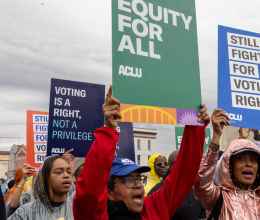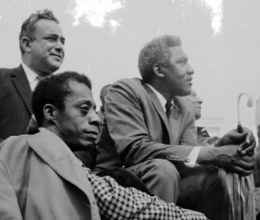
This post is also published in South Florida Sun-Sentinel.
Three state legislators recently used this editorial space to champion SB 7066, a law they passed this year to block 80 percent of returning citizens from voting in Florida elections.
In fact, they proudly proclaimed that individuals with prior felony convictions don’t deserve to vote. To quote from their op-ed, “We, the law-abiding citizens of this great Republic don’t owe ex-felons anything.” Despite what they claim in the article, they clearly don’t believe in second chances.
Republicans, Democrats and independents supported Amendment 4 and restoring voting rights to 1.4 million people last November. But SB 7066, designed to limit Amendment 4, passed this spring along party lines and effectively restricted the amendment’s scope to a fraction of the returning citizens it was meant to benefit.
If you voted for Amendment 4, you should be outraged by what these legislators did. They disregarded your vote and ignored your voice. We fought to end the injustice of Jim Crow voter disenfranchisement and ensure that returning citizens can participate in our democracy once they have served their time for a felony conviction. We fought for second chances and collectively won that fight by passing Amendment 4.
Now, these three legislators are trying to tell you that you misunderstood what your support for Amendment 4 meant, even though the wording was clear. Amendment 4 stated that, except for persons convicted of murder or felony sexual offenses, “(t)he amendment restores the voting rights of Floridians with felony convictions after they complete all terms of their sentence including parole or probation.”
The Florida Supreme Court reviewed the amendment’s language and approved it. The justices did not say that returning citizens had to pay court fees or fines to vote, which is what SB 7066 mandates. Nothing in Amendment 4’s text excluded the right to vote for those who could not afford to pay.
If you voted for Amendment 4, you correctly believed that it was designed to restore voting rights, regardless of the size of one’s bank account. You correctly understood that the amendment’s purpose was to increase the number of individuals who are eligible to vote. Amendment 4 was about fairness and giving fellow Floridians a second chance.
Maybe you also were one of the voters who was tired of Florida being one of only four states still using racist Jim Crow laws to prohibit Floridians — particularly Black Floridians — from participating in the democratic process. Although 17 percent of Floridians are black, the percentage of black voters disenfranchised by our state constitution was twice that percentage. And SB 7066 creates a voter disenfranchisement scheme even worse than the unfettered, arbitrary and inequitable system we have had until now, administered by Florida’s Executive Clemency Board.
It’s clear, from the 5.1 million voters who passed Amendment 4, that we were collectively outraged that our state remained a bulwark of racial injustice. But according to these legislators, you misunderstood what you did when you voted “yes” for Amendment 4.
Tellingly, this same power bloc said the public did not know what it wanted in 2016 when 71 percent of voters approved a constitutional amendment allowing the use of medical marijuana. Unsurprisingly, these legislators have worked actively to undercut that amendment.
That same bloc also told 74 percent of voters who backed the 2014 Water and Land Conservation Initiative that they did not know what they really wanted. Voters knew they allocated state funds to purchase and protect environmentally vulnerable natural treasures. Subsequently, Tallahassee’s political machine has repeatedly used that money for purposes completely unrelated to preserving our environment and Florida’s natural treasures.
Indeed, this same political machine passed a law this year making it substantially harder for citizens to place future constitutional amendments on the ballot. They know they cannot control what Floridians want and know is right, therefore, these legislators endeavor to restrict Florida voters from shaping a more just and inclusive state.
Soon after you approved Amendment 4, newly-elected governor Ron DeSantis announced his belief that Florida’s Constitution required “implementing language,” which was nothing more than a way of undermining the amendment’s purpose. The tactics of the governor and these legislators are not novel. Indeed, such efforts to undermine truly representative government and the will of the people were commonplace during the Reconstruction era through the passage of Jim Crow laws.
When our country ratified the Fifteenth Amendment to the U.S. Constitution in 1870, granting African-American men the right to vote, states like Florida immediately adopted so-called “implementing language” to undermine it. Literacy tests and poll taxes became the order of the day.
Even more telling, soon after DeSantis signed SB7066 into law, he said Amendment 4 was a “mistake.”
The op-ed authors — Speaker Pro Tem MaryLynn Magar of Hobe Sound, Majority Leader Dane Eagle of Cape Coral, and Majority Whip Mike Grant of Port Charlotte — argue SB 7066 is not a poll tax and claim they are outraged anyone would label it that way. But their representations do not change the fact that hundreds of thousands of returning citizens will not be able to vote because they can never afford to pay certain amounts of money. If it looks like a poll tax and smells like a poll tax, then it is a poll tax.
That Florida’s current leadership remains unwilling to break with the state’s dismal history of voter suppression is disgraceful. That is what Floridians voted for in November — no matter what some lawmakers want you to believe.




